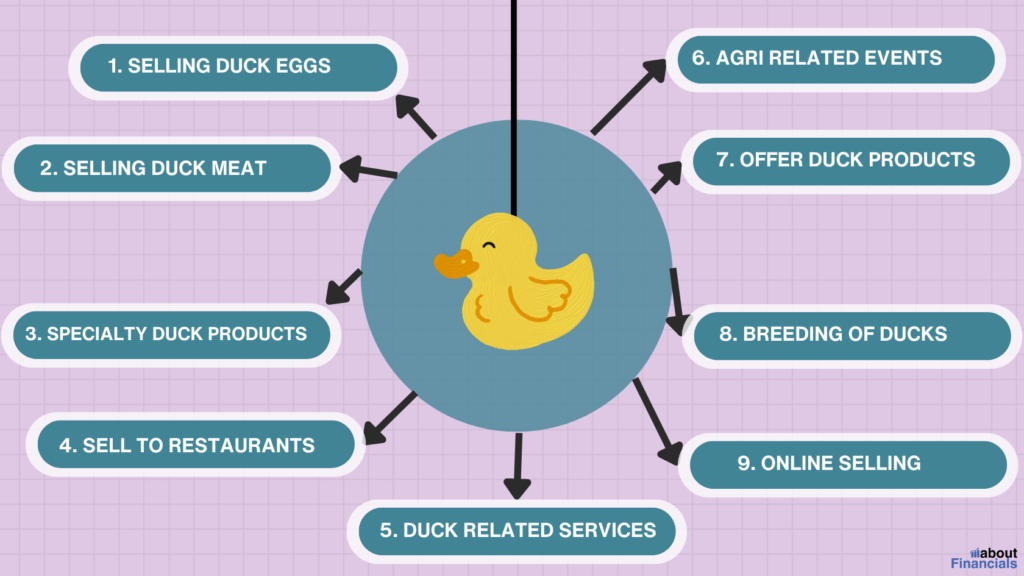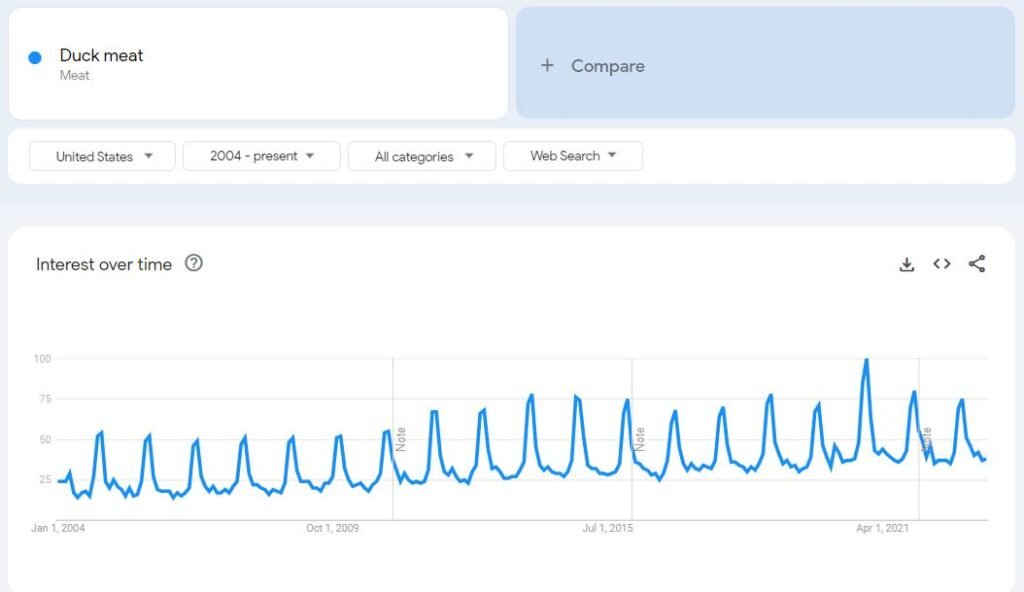If you’re seeking a unique and lucrative venture, exploring how to make money from ducks can be a promising opportunity.
Duck farming offers a range of income-generating possibilities, from selling duck eggs and meat to producing specialty duck products.
With the right strategies and a keen focus on financial aspects, you can turn your duck farming operation into a profitable enterprise.
We will delve into various avenues for generating income from ducks and explore the key financial considerations that can help you maximize your returns.
Top 9 ways on how to make money from ducks

1. Selling duck eggs
When it comes to making money from duck farming, selling duck eggs can be a cracking good opportunity.

Duck eggs have gained popularity in recent years due to their unique flavor, larger size, and nutritional value. By tapping into this demand, you can quack your way to profits.
Imagine the joy of gathering freshly laid duck eggs from your flock and offering them to eager customers. These eggs often have a richer taste and a creamier texture than chicken eggs, making them a sought-after delicacy for culinary enthusiasts and health-conscious individuals alike.
From gourmet chefs who appreciate their versatility in recipes to individuals with dietary restrictions who find duck eggs easier to digest, the market for duck eggs continues to expand.
To successfully sell duck eggs, you’ll need to build a reputation for quality and reliability. Consider packaging the eggs in visually appealing cartons, clearly labeling them as fresh duck eggs. Establishing relationships with local grocery stores, farmers’ markets, and even directly engaging with customers through online platforms can help increase your visibility and sales.
2. Make money by selling duck meat
If you’re looking to capitalize on the culinary market and satisfy meat-loving customers, selling duck meat can be a winged pathway to profitability.

Whether you choose to sell whole ducks, duck cuts, or processed products, such as duck sausages or smoked duck breasts, there are numerous opportunities to cater to different consumer preferences.
High-end restaurants, specialty food stores, and individuals seeking gourmet ingredients are often eager to procure this flavorful alternative.
To maximize your sales, it’s crucial to emphasize the exceptional qualities of duck meat.
Highlight the tenderness, distinct taste, and versatility that make it an excellent choice for both everyday meals and special occasions.
Collaborating with local chefs or offering cooking demonstrations can showcase the potential of duck meat and inspire customers to try it for themselves.
3. Producing specialty duck products
Duck farming opens doors to more than just eggs and meat.
By delving into the production of specialty duck products, you can add feathers to your financial cap and create a niche market for your farm.
From feathers and down to luxurious delicacies like foie gras and duck pâté, the possibilities are as diverse as the feathers in a flock.

Feathers and down can be in high demand for various creative industries, including fashion, crafts, and home decor.
Artisans and designers often seek unique materials to add an exquisite touch to their creations, and your farm can become a prime source for these luxurious elements. By marketing your feathers and down to these industries, you can feather your nest with additional revenue streams.
Emphasize the craftsmanship, sustainability, and unrivaled quality of these products, and watch as your farm gains recognition as a destination for specialty duck delights.
4. Building relationships with restaurants
In the dynamic world of duck farming, forging strong relationships with restaurants, hotels, and specialty food stores can unlock many opportunities.
By establishing these valuable connections, you can showcase the quality of your offerings to a wider audience and propel your farm to new heights of success.

Engage in meaningful conversations, provide samples, and share your passion for raising exceptional ducks. With each successful collaboration, you strengthen your reputation and open doors to new opportunities.
Hotels, with their discerning guests and reputation for luxury, are another prime market for your premium duck offerings.
Consider creating tailor-made products or exclusive dishes that cater to their unique needs and enhance their culinary offerings. Collaborating with hotels not only provides a steady stream of orders but also positions your farm as a purveyor of exquisite, high-end ingredients.
Showcase your ducks alongside other carefully curated offerings, and educate store owners and staff about the distinctive qualities that set your products apart. By fostering relationships based on trust and quality, you can secure a dedicated shelf space and attract customers seeking exceptional duck products.
5. Selling duck-related services
Duck farming is not just about the products themselves—it’s about the valuable services you can offer as well.
Consider agro-tourism, where individuals desire for an authentic farm experience and the opportunity to connect with nature.
By opening your farm gates to visitors, you can offer guided tours, hands-on activities, and educational workshops that provide an immersive and enriching experience. Imagine families, school groups, and even urban dwellers delighting in the chance to interact with your charming ducks, learn about their care, and gain a deeper appreciation for sustainable agriculture.
When marketing duck-related services, highlight the unique value they bring to customers’ lives. Showcase testimonials and success stories, emphasizing the joy, educational opportunities, and practical benefits associated with each service.
By positioning yourself as a trusted provider of specialized services, you can broaden your customer base and establish a reputation for excellence beyond your core products.
6. Participating in farmers’ markets and agricultural fairs
Embrace the vibrant atmosphere of farmers’ markets and agricultural fairs—a bustling stage where farmers and producers gather to showcase their bountiful offerings.
Participating in these events allows you to connect directly with customers who appreciate fresh, locally sourced goods and seek a personal connection with the people who grow their food.
Farmers’ markets provide a unique platform for you to display your premium duck products. Set up an inviting stall, adorned with colorful signage that highlights the quality and benefits of your offerings.
By interacting directly with customers, you can establish a personal connection, answer their questions, and build trust in the exceptional quality of your duck products.
Consider hosting live demonstrations or cooking workshops where attendees can witness the culinary potential of duck meat firsthand.
Share cooking tips, recipes, and creative ways to incorporate duck eggs into delectable dishes. By offering a memorable and interactive experience, you can leave a lasting impression and inspire visitors to become loyal customers.
7. Offering duck-related products to generate extra income
Offer a range of duck-related products, such as feed, housing, and equipment, you can become a valuable resource and trusted partner within the farming community.
By providing fellow farmers with access to high-quality duck feed, you enable them to give their flocks the nourishment they need to flourish.
Whether it’s a specially formulated blend or a selection of nutritious options, offering top-notch feed ensures that ducks receive the essential nutrients they require at each stage of their growth.
Housing is another crucial aspect of successful duck farming. Offer housing options tailored to the specific needs of ducks, you equip fellow farmers with the tools to create optimal living conditions for their flocks. From spacious and secure enclosures to cozy nesting areas, the right housing contributes to healthier, happier ducks.
Moreover, supplying essential equipment plays a vital role in supporting the operations of fellow farmers. Waterers, feeders, incubators, and other farming equipment can streamline processes, improve productivity, and enhance overall efficiency.
By offering reliable and durable equipment, you contribute to the success and sustainability of other farming ventures, helping farmers focus on what they do best—raising healthy and thriving ducks.
8. Engaging in breeding and selling high-quality ducklings
Breeding and selling high-quality ducklings present a unique opportunity for duck farmers to contribute to the growth of the industry and provide others with top-notch genetics for their flocks.
By engaging in careful breeding practices and offering superior ducklings, you can make a significant impact on the success of fellow farmers and enthusiasts.
Breeding high-quality ducklings begins with the selection of superior breeding stock. Choose ducks with desirable traits, such as strong health, good egg production, excellent meat quality, and appealing physical attributes. Through selective breeding, you can develop a breeding program that produces offspring with enhanced genetics, ensuring the next generation of healthy and productive ducks.
9. Leveraging online presence to make money from ducks
To reach potential customers, establish a strong online presence. Create a professional website or online store that showcases your breeding program, provides detailed information about available ducklings, and offers educational resources for prospective buyers.

Utilize social media platforms to share updates, photos, and success stories, connecting with individuals interested in starting or expanding their duck farming endeavors.
Setting up a profitable duck farming operation
Embarking on a duck farming venture can be an exciting and fulfilling endeavor. To set yourself up for success, careful planning and preparation are essential. Here are some key steps to consider when setting up your duck farming operation.

1. Choosing the right duck breed for profitability
The choice of duck breed is crucial to the profitability and success of your farming operation. Different breeds have distinct characteristics, such as egg-laying capacity, meat quality, growth rate, and adaptability to different environments.
There are numerous breeds of ducks, each with its own unique characteristics and purposes. Here are some popular types of ducks and their respective purposes:
- Pekin ducks are one of the most common breeds raised for meat production. They are known for their large size, rapid growth rate, and excellent meat quality. Pekin ducks have white feathers and a calm temperament, making them easy to handle and manage.
- Khaki Campbell Ducks they are primarily kept for their exceptional egg-laying abilities. They are prolific layers, capable of producing up to 300 eggs per year. These ducks have a khaki-colored plumage and are known for their active and energetic nature.
- Muscovy ducks are valued for their lean and tender meat, often considered more akin to red meat than poultry. Muscovy ducks have a wide range of feather colors and patterns, and they are known for their ability to control insect populations due to their voracious appetite for pests.
- Runner ducks are known for their upright, “runner-like” stance and slender bodies. They are highly active and excellent foragers. While they are not the best egg layers, their primary purpose is pest control. Runner ducks are particularly effective in controlling slugs, snails, and other garden pests, making them popular choices for organic and permaculture farms.
- Rouen ducks are often raised for their beautiful plumage and as exhibition birds. They closely resemble wild mallards in appearance, with striking green heads and a mix of dark and light feathers. While Rouen ducks are not as efficient in egg production as other breeds, they are favored for their ornamental value and are often showcased in avian competitions.
- Call ducks are small-sized ducks with a distinctive, high-pitched “call” or quack. They are primarily kept as pets or for ornamental purposes due to their small stature and charming appearance. Call ducks come in various colors and are known for their friendly and sociable nature.
2. Determining the scale of your operation and assessing initial investment costs
Before diving into duck farming, it’s essential to determine the scale of your operation.

Assess your available resources, including land, capital, and labor, to determine the number of ducks you can comfortably manage.
Consider the market demand, your target audience, and the resources needed to support your chosen scale.
This assessment will help you estimate the initial investment costs, including land acquisition or lease, construction or modification of housing facilities, purchase of equipment, and acquiring the initial flock.
Proper financial planning and forecasting will ensure you have a clear understanding of the capital requirements for your venture.
3. Selecting an appropriate location and infrastructure
Choosing the right location for your duck farm is vital for ensuring the health and well-being of your flock, as well as optimizing operational efficiency.
Look for a site that offers ample space, good drainage, access to a clean water source, and protection from extreme weather conditions.
Additionally, consider the proximity to markets and suppliers to minimize transportation costs. The infrastructure should include well-designed housing facilities that provide adequate space, ventilation, and protection from predators. Implement biosecurity measures to prevent the spread of diseases and ensure the safety of your flock.
4. Creating a budget
Developing a comprehensive budget is crucial to ensure the smooth operation of your duck farm.
Consider the costs of essential equipment, such as feeders, waterers, incubators, and heat lamps.
Factor in the construction or modification of housing facilities, including materials, labor, and any necessary permits.
Additionally, estimate ongoing expenses such as feed, veterinary care, utilities, and marketing. Conduct thorough market research to understand the pricing dynamics and set realistic revenue expectations.
A well-planned budget will help you assess the financial feasibility of your venture and guide your decision-making processes.
5. Pricing strategies for duck eggs
To maximize your profitability in the duck egg market, it’s crucial to understand market demand and implement effective pricing strategies.
Consider factors such as local demand, consumer trends, and competition from other egg suppliers.
Pricing strategies can include competitive pricing, premium pricing for specialty or organic eggs, or even creating value-added packaging or marketing campaigns to differentiate your product and attract customers willing to pay a premium for quality.
6. Techniques to minimize expenses
Feed is one of the most significant expenses in duck farming, so implementing effective feed management techniques is crucial to minimize costs.
Purchase feed ingredients in bulk to take advantage of economies of scale. Proper storage and handling of feed can also minimize waste and spoilage.
Consider utilizing alternative feed sources such as pasture grazing, forage crops, or agricultural byproducts to reduce dependence on commercial feed.
Additionally, regularly monitor your ducks’ feed consumption and adjust feeding quantities accordingly to avoid overfeeding or underfeeding, thus optimizing feed utilization and minimizing expenses.
7. Reduce health issues and losses
Maintaining a healthy flock is vital for maximizing productivity and minimizing losses.
Provide clean and comfortable housing with proper ventilation to prevent the spread of diseases. Practice good hygiene, including regular cleaning and disinfection of waterers, feeders, and housing facilities.
Monitor flock behavior, feed consumption, and egg production to detect any signs of illness or stress early on.
Quick intervention and appropriate veterinary care can help minimize the impact of health issues and reduce losses. Maintaining a well-managed and healthy flock ensures optimal egg production, growth rates, and overall farm profitability.
8. Consider renewable resources to cut down utility costs
Reducing utility costs can significantly contribute to the financial sustainability of your duck farming operation.
Install energy-efficient lighting systems, such as LED lights, which consume less electricity and have a longer lifespan.
Consider utilizing solar panels to generate renewable energy for heating or electrical needs. Implement insulation and energy-efficient design in your housing facilities to minimize heat loss during colder months.
Additionally, explore opportunities for utilizing renewable resources, such as using duck manure as fertilizer for crops or implementing biogas systems to generate energy from waste.
9. Track expenses, revenue, and profitability
To maintain a clear financial overview of your duck farming business, it’s essential to track expenses, revenue, and profitability accurately.
Utilize accounting software or spreadsheets to record and analyze your financial transactions. Categorize expenses such as feed, equipment, veterinary care, and labor to understand the breakdown of costs.
Track revenue from the sale of eggs, meat, or other duck-related products. Regularly review and analyze your financial statements to assess your farm’s profitability, identify areas for improvement, and make informed business decisions.
Final thoughts
If you’re wondering how to make money from ducks, the key lies in capitalizing on the diverse revenue streams available. By selling duck eggs, meat, and specialty products, you can tap into multiple markets and cater to different consumer preferences.
By implementing sound financial practices, keeping track of expenses and revenue, and exploring cost-saving measures, you can enhance the profitability of your operation.
Remember, success in duck farming lies not only in the quality of your products but also in your ability to navigate the financial aspects and seize lucrative opportunities.
With dedication, perseverance, and a strategic approach, you can truly make money from ducks and build a thriving and sustainable business.

